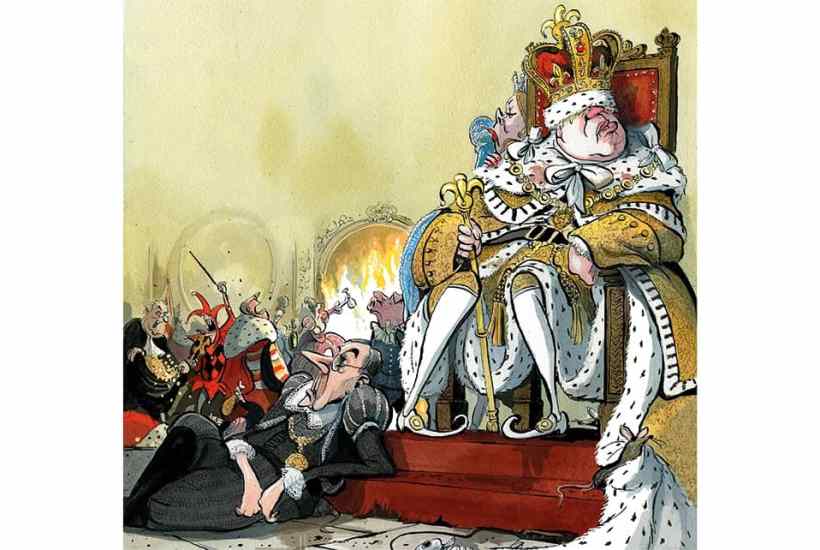What is the purpose of a Conservative government? It’s a reasonable question for voters to ask. In 2019 Boris Johnson gave us a clear answer: he was a different type of politician. He would get Brexit done, then protect the public from the rising costs of government by freezing taxes. The public, he said, had had enough of weasel words and broken politics. He stood as an unconventional prime minister who would sweep away Westminster’s failing conventions.
Instead, he is in danger of sweeping away the conventions that actually worked. The country is now being deprived of a functional government: one that is capable of planning longer than a fortnight ahead. For Johnson, survival is victory. And to survive, he makes promises which he cannot keep – or, in the case of steel tariffs, should not keep. Basic standards – honesty, consistency, competence, transparency – are being jettisoned to save his skin.
Still, some facts remain. Johnson won a massive democratic mandate just over two years ago – and that mandate was for a five-year term. How many of the MPs now conspiring to depose him would even be in parliament were it not for him? Who else in the cabinet could have vanquished Corbynism and turned a Tory collapse into a Tory landslide in such a short space of time? Who else would have won over so many voters in northern England? A mandate conferred by millions of voters should not be overturned casually by a cabinet plot.
Where are the better ideas? One of the most depressing aspects of this drama is how even now Johnson absorbs all the oxygen of the political debate. He is all that anyone in Westminster can talk about. So much so that people forget they are looking at a choice: if he leaves No. 10 then someone else must take his place. Jeremy Hunt had been the bookmakers’ favourite for weeks, with Liz Truss close behind him. Would either represent an improvement so great as to compensate for the agony of deposing a sitting prime minister?
To depose Johnson out of pique is not a responsible political act. There is always a choice: a convincing case has to be made that the alternative is better. It might be argued that he has become a lightning rod for public discontent, that his presence in No. 10 risks provoking a unique anti-Tory alliance that would not arise with any other leader. But as things stand, not one of the 358 Tory MPs has clearly made that argument.
The Conservatives have already made one attempt to depose the Prime Minister, when 40 per cent of MPs voted against him last month. The cabinet resignations this week constitute a second failed attempt. Every time, there is a lack of thinking and coordination. No matter who comes next, inflation will be heading towards 10 per cent and the national debt will be surging. Where are the plausible ideas to combat this? Even Nadhim Zahawi’s preferred economic strategy – to borrow more – is hinted at rather than openly explained. When that idea was first mooted, by backbenchers in 2020, interest rates were about half what they are now.
There is little or no original thinking about how to deal with the difficulties we face at present. Why does the Conservative party combine such despair with an inability to produce a better agenda? And without better ideas, what’s the point of deposing the Prime Minister?
The Tories have a hard-won reputation as Europe’s leaders in political regicide – but in the past it was always regicide with a purpose. Now, it just looks like rage. To be sure, No. 10’s distortions over Chris Pincher are indefensible. As with partygate, we see false denials exposed in a way that debases politics. A succession of ministers concluding that they cannot take the No. 10 madness any longer looks more like a collective nervous breakdown than a scheme for renewal.
A sober balance sheet of Johnsonianism should include serious achievements. Britain has repositioned itself as a leading player in what Liz Truss, the Foreign Secretary, describes as the ‘network of liberty’. Post-Brexit alliances are being struck in a new era of multilateralism: when Sweden and Finland applied to join Nato, they found Britain offering solid support that not even the United States had been prepared to give. Four streets in Ukraine are named after Johnson, in recognition of his ability to match words with immediate action.
It does not seem likely that any streets in Britain will be named after him. His domestic legacy is the lockdown, which may yet prove to have been the most damaging policy ever introduced by a modern government. His refusal to conduct a cost-benefit analysis on lockdown, or to ask serious questions about its impact on children, compounds the damage. The NHS, whose hospitals were 40 per cent empty even at the peak of the pandemic, may never recover.
This is the root problem: the failure to talk plainly about the educational, economic and social harm of lockdown indicates a failure to think clearly about solutions. This has now translated into a failure to govern. A Tory party that obsesses about problems in No. 10 while being unable to find answers outside of No. 10 is not committing regicide but suicide.
Got something to add? Join the discussion and comment below.
Get 10 issues for just $10
Subscribe to The Spectator Australia today for the next 10 magazine issues, plus full online access, for just $10.
You might disagree with half of it, but you’ll enjoy reading all of it. Try your first month for free, then just $2 a week for the remainder of your first year.














Comments
Don't miss out
Join the conversation with other Spectator Australia readers. Subscribe to leave a comment.
SUBSCRIBEAlready a subscriber? Log in